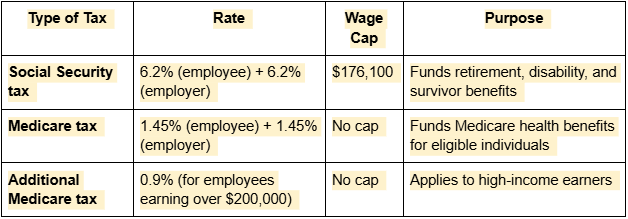What are Social Security contributions?
Social Security contributions are mandatory payroll taxes that fund the Social Security program, which provides financial assistance for retirees, individuals with disabilities, and surviving family members of deceased workers. Both employers and employees contribute to the program through Federal Insurance Contributions Act (FICA) taxes, which help ensure future financial stability for millions of Americans.
For small businesses, keeping track of Social Security contributions is essential for accurate payroll processing and tax compliance. Homebase helps employers manage employee wages, time tracking, and tax withholdings effortlessly, reducing the risk of errors and penalties.
How do Social Security contributions work?
Employers and employees share the responsibility for funding Social Security. As of 2025, the tax rates are:
- 6.2% of wages paid by employees (automatically deducted from each paycheck).
- 6.2% of wages paid by employers (matched by the business).
- Total contribution: 12.4% of an employee’s wages.
These contributions are withheld from employee paychecks and remitted to the IRS, ensuring that eligible workers can receive Social Security benefits upon retirement or in the event of disability.
What is the Social Security wage cap?
The Social Security wage cap is the maximum earnings limit subject to Social Security tax. For 2025, this cap is $176,100. This means:
- Employees only pay Social Security tax on wages up to $176,100.
- Any wages earned above this limit are not subject to Social Security tax.
- Employers stop matching Social Security contributions once an employee reaches the cap.
The Social Security Administration (SSA) adjusts this cap annually to reflect cost-of-living changes. Employers should stay updated on these changes to avoid payroll miscalculations.
How do Social Security contributions affect payroll?
Employers must:
- Withhold Social Security taxes from employee paychecks each payroll cycle.
- Match employee contributions dollar-for-dollar and submit payments to the IRS.
- Report Social Security contributions on payroll tax forms, such as Form 941 (quarterly payroll tax return).
- Ensure compliance with IRS regulations to avoid fines and audits.
Using Homebase, businesses can automatically track earnings, apply the correct tax rates, and ensure that Social Security tax stops at the wage cap.
Try Homebase today to simplify payroll tax tracking and compliance.
Social Security vs. Medicare taxes
While Social Security and Medicare taxes are both part of FICA taxes, they serve different purposes:

Unlike Social Security tax, Medicare tax has no wage cap, meaning all earnings are subject to Medicare tax, regardless of income level.
How to report and pay Social Security contributions
Employers are responsible for:
- Calculating Social Security taxes correctly based on employee wages.
- Withholding the correct amount from employee paychecks.
- Matching employee contributions and submitting payments to the IRS.
- Filing payroll tax returns (Form 941) every quarter to report Social Security taxes.
- Using the Electronic Federal Tax Payment System (EFTPS) to deposit taxes on time.
Failure to properly report and submit Social Security taxes can lead to IRS penalties, interest charges, and potential legal issues.
Common mistakes businesses make with Social Security contributions
Employers often make the following errors when managing Social Security contributions:
- Failing to withhold the correct amount – Incorrect tax calculations can lead to tax underpayment and IRS penalties.
- Not stopping contributions after reaching the wage cap – Overpaying Social Security tax can cause payroll inconsistencies.
- Missing tax deadlines – Late tax payments result in IRS penalties and interest.
- Misclassifying employees – Employers must distinguish between W-2 employees (subject to Social Security tax) and independent contractors (who pay self-employment tax instead).
Using Homebase, businesses can prevent these errors by automating tax calculations and payroll compliance.
Sign up for Homebase today to ensure accurate payroll processing and tax compliance.
How Homebase Payroll helps businesses manage Social Security contributions
Tracking payroll taxes manually can be time-consuming and error-prone, but Homebase makes it easier by:
- Automatically calculating and withholding Social Security taxes.
- Ensuring payroll compliance with IRS wage caps and tax rates.
- Filing payroll tax reports, including Form 941, on time.
- Providing payroll records to help businesses track tax contributions and avoid mistakes.